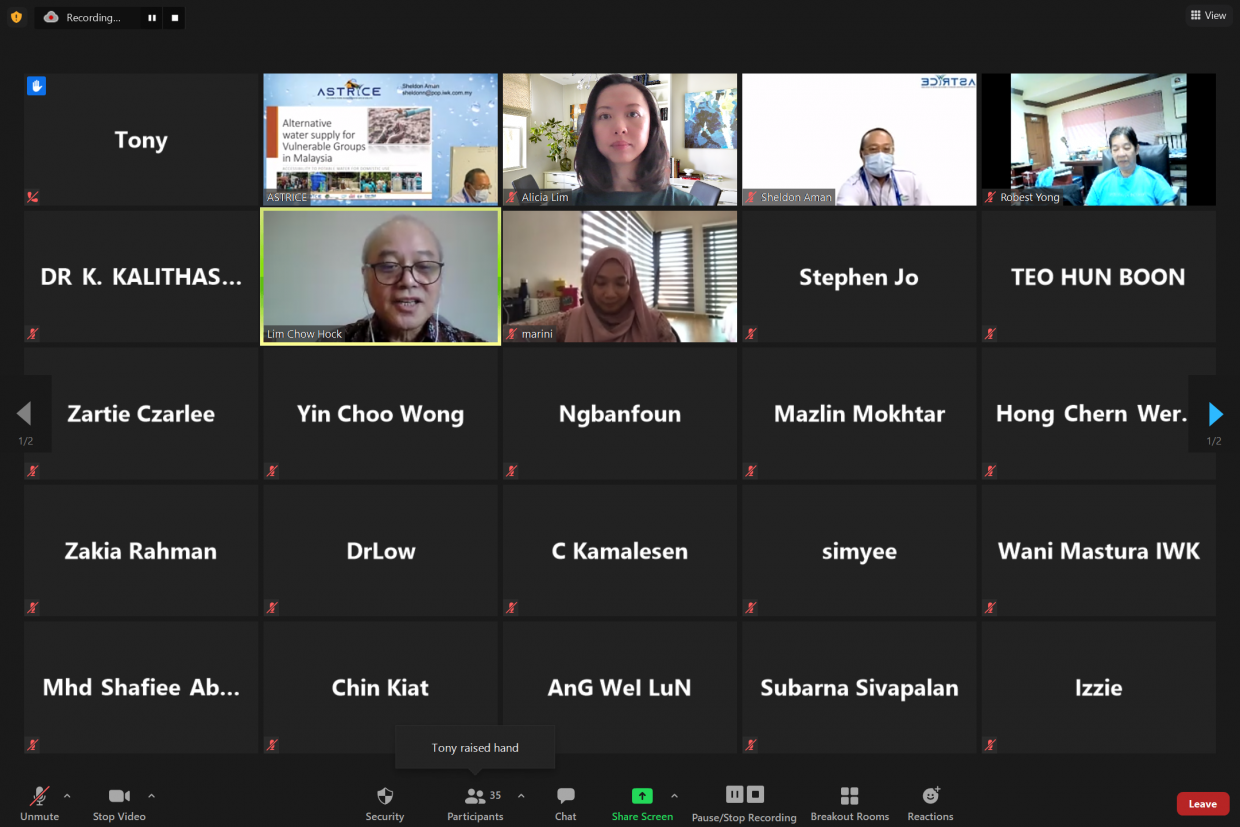Climate-Resilient Water Management for the Future: Flood & Drought
The Malaysian Capacity Development Network for Sustainable Water Management (MyCDNet) successfully organised the Climate-Resilient Water Management for the Future: Flood & Drought webinar on 29 July 2021. Hosted by Asian Sewerage Training, Research & Innovation Centre of Excellence (ASTRICE) and supported by Cap-Net UNDP, the event drew more than 100 participants.
It was a lively knowledge-sharing session focused on water management during flood and drought from the perspectives of the National Flood Forecast & Warning Centre (PRABN) and the National Water Balance Management System (NAWABS).
Network Manager of MyCDNet Dato’ Ir Lim Chow Hock opened the webinar with welcoming remarks and an introduction of MyCDNet and Cap-Net UNDP. The webinar was moderated by Ir. Hj. Md Khairi bin Selamat, Deputy Network Manager of MyCDNet, who was the Director of the River Basin Management Division of the Department of Irrigation & Drainage Malaysia.

(Photo caption: Moderator Ir. Hj. Md Khairi bin Selamat, Deputy Network Manager of MyCDNet)
The prominent speakers were Ir. Dr. Mohd Zaharifudin bin Muhamad Ali, Principal Assistant Director for PRABN, and Ir. Dr. Asnor Muizan Ishak, Chief of Section for Technical Advice for NAWABS. Both are water management system under the Department of Irrigation & Drainage Malaysia.

(Caption: Ir. Dr. Mohd Zaharifudin bin Muhamad Ali, Principal Assistant Director for PRABN)

(Caption: Ir. Dr. Asnor Muizan Ishak, Chief of Section for Technical Advice for NAWABS)
Feedbacks and comments from participants were very positive with suggestions to carry out more webinars with similar scope. For the majority, the content was interesting and eye-opening.
Training slides are available under Resources – Training Slides – MyCDNet.
Replay:
- Published in Environment, Outreach, Past Events
Alternative Water Supply for Vulnerable Groups in Malaysia
The Malaysian Capacity Development Network for Sustainable Water Management (MyCDNet) and Indah Water Konsortium Sdn Bhd (IWK) successfully co-organised the webinar titled “Alternative Water Supply for Vulnerable Groups in Malaysia”. Held on 2 June 2021, the event was hosted by Asian Sewerage Training, Research & Innovation Centre of Excellence (ASTRICE), and in partnership with National Water Research Institute of Malaysia (NAHRIM), Global Environment Centre (GEC) and EFINITY Social Enterprise. The webinar was supported by Cap-Net UNDP.
This webinar aimed to create awareness on challenges faced by Vulnerable Groups in Malaysia for potable water supply. The two-hour online seminar illustrated some current solutions for providing clean water to vulnerable groups in the event of water disruptions or unavailability of piped water from the treatment plants. The objective was to highlight alternatives for these groups to gain access to potable water for domestic use. We hoped that through this seminar, the participants will be able to better utilise their talents, skills and resources in advancing communal practice of water use, within and outside of their organisation.
Network Manager of MyCDNet Dato’ Ir Lim Chow Hock opened the webinar with welcoming remarks and an introduction of MyCDNet and Cap-Net UNDP. The webinar was moderated by Mr Sheldon Boyd Aman from ASTRICE.

The first speaker, Mr Robest Yong from EFINITY Social Enterprise, presented “Making Potable Water” with an innovative, simple, portable filtration system that is used in many hard-to-reach areas within Malaysia as well as the Asian region. After a brief Q&A session with Mr. Yong, Dr. Kalithasan Kailasam from Global Environment Centre gave a comprehensive presentation on the available types of alternative water sources, and case studies of projects focused on conserving water resources and supply for communities. There was a Q&A session with Dr. Kalithasan before the final speaker. Ir. Marini Mohamad Ideris gave the participants an in-depth look into the R&D initiatives on rainwater harvesting system by NAHRIM. Extra time was allowed for Q&As and comments by participants before the Moderator closed the webinar session



Feedbacks and comments from participants were very positive with good suggestions and recommendations. For the majority, the course offered new perspectives and new contents.
View Course Material
- Published in Environment, Outreach, Past Events



